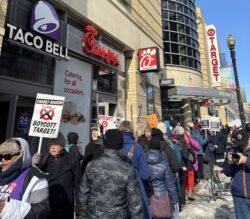In the latest development in the continuing videotaping controversy, the Metropolitan Police Department has affirmed the legality of the practice and negated the claim that Georgetown residents were responsible for a proposal that residents videotape unruly students.
Since its proposal on Jan. 15, the plan has caused a great deal of negative student reaction and strained relations between students and neighborhood organizations.
Ray Kukulsky, President of the Citizens’ Association of Georgetown, rejected claims that his organization and the Alliance for Local Living, a loose organization of students, faculty, and Georgetown locals, had encouraged local residents to tape students who are publicly breaking the law.
Instead, he said that at the Alliance meeting on Jan. 15, Captain Michael Jacobs of the Metro Police Department, promoted videotaping students as a legal and effective way to target problematic students. Jacobs was at the meeting to give a police report to the residents.
Jacobs said that the MPD was not involved in the video taping of students, but that if video tapes were handed into them, they would take legal action against the students caught on tape.
ALL member Mike Glick (CAS ‘05) also denied that his organization had proposed videotaping students, but said that the Citizen’s Association had encouraged residents to enact the plan.
“I’m disappointed by the threat of videotaping made by the CAG. There are better ways to achieve change around here,” Glick said.
Kukulsky, however, said that videotaping is a right that Georgetown citizens are free to exercise if circumstances call for it. “Residents are correctly concerned with the current situation. Any resident who is kept awake night after night, whose property is being repeatedly vandalized, has a right to do this,” Kukulsky said.
Jacobs said that no video tapes of Georgetown students have been handed in to the police department yet.
According to Jacobs, video-taping has been an effective way of dealing with problematic students in the District in the past. He recalled that residents of the Brookland neighborhood around Catholic University effectively used videotaping to curb loud parties in 1999.
“They finally videotaped, it ended up on the news, and the parties stopped,” he said. “It was very effective, and the residents remember that.”
Police also used videotapes and pictures in College Park three years ago to make arrests after riots at the University of Maryland.
Campaign Georgetown, an organization devoted to involving students in local politics, is leading the drive against the plan to videotape students. Co-chair Matt Ingham (CAS ‘04), said that future actions against the proposal will depend on how residents use it. So far, Campaign Georgetown has established a web site that explains the situation and offers a form letter asking the Citizen’s Association and the Alliance to repeal their proposal.
“We’re not against students being held responsible for their actions. Our concern is that the video tapes will be used be to shoot down larger issues such as zoning permission and student enrollment caps,” Ingham said.
According to Kukulsky, there were 35 calls in which police had to respond to an incident and 11 calls that resulted in student arrests last year. He said that residents are frustrated with the repeated instances of disruptive conduct.
Ingham, however, believes that current disciplinary tactics, such as the Student Neighborhood Assistance Program, are sufficient. “We don’t perceive that the problem has really elevated to the point that videotaping is necessary,” said Ingham.




